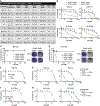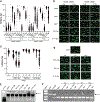Mechanism-based design of agents that selectively target drug-resistant glioma
- PMID: 35901163
- PMCID: PMC9502022
- DOI: 10.1126/science.abn7570
Mechanism-based design of agents that selectively target drug-resistant glioma
Abstract
Approximately half of glioblastoma and more than two-thirds of grade II and III glioma tumors lack the DNA repair protein O6-methylguanine methyl transferase (MGMT). MGMT-deficient tumors respond initially to the DNA methylation agent temozolomide (TMZ) but frequently acquire resistance through loss of the mismatch repair (MMR) pathway. We report the development of agents that overcome this resistance mechanism by inducing MMR-independent cell killing selectively in MGMT-silenced tumors. These agents deposit a dynamic DNA lesion that can be reversed by MGMT but slowly evolves into an interstrand cross-link in MGMT-deficient settings, resulting in MMR-independent cell death with low toxicity in vitro and in vivo. This discovery may lead to new treatments for gliomas and may represent a new paradigm for designing chemotherapeutics that exploit specific DNA repair defects.
Figures






Comment in
-
Targeting brain cancer.Science. 2022 Jul 29;377(6605):467-468. doi: 10.1126/science.add4839. Epub 2022 Jul 28. Science. 2022. PMID: 35901132
-
Targeting drug-resistant glioblastoma.Nat Rev Drug Discov. 2022 Oct;21(10):711. doi: 10.1038/d41573-022-00146-7. Nat Rev Drug Discov. 2022. PMID: 36045286 No abstract available.
References
MeSH terms
Substances
Grants and funding
LinkOut - more resources
Full Text Sources
Medical
Research Materials

